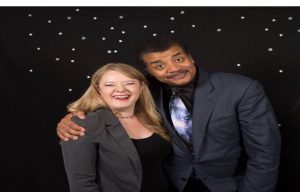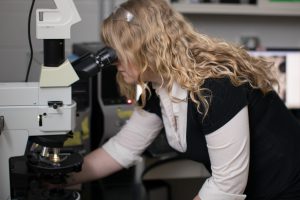What is your scientific background?
My scientific background has become fluid over the years as I had a passion for studying science — geology is multidisciplinary. I started in a physics program during my undergraduate. I loved my astronomy courses but struggled with the upper-level physics focusing on mechanics (e.g. electrical field, electric potential energy). I had an opportunity to test a new degree under an earth sciences degree and integrate astronomy, atmospheric science, geology, and oceanography. I had a senior project studying terrestrial basalts for a Martian analog and participated in an internship at SETI Institute studying Martian slope streaks.

My passion for planetary geology grew and I accepted a position at the US Geological Survey while concurrently completing my master’s degree in geology with a physics minor. There I focused on Martian dust devils, using NASA HiRISE (a high-resolution camera on the Mars Reconnaissance Orbiter) and the rover Spirit. Unfortunately, due to federal program cuts, I took an internship at NETL to assist in electron microscopy. So I went from image analysis of a planetary surface to microanalysis of rocks. Over the last 7 years, I’ve developed knowledge to better understand complex engineered natural systems.
Do you come from an academic family?
I am proud to say that I am actually the first in my family to go to college and get an advanced degree. My mother was a single parent trying to raise my sister and me. She firmly believed in education and did what she could to encourage my curiosity within her means. My early childhood was spent being read to which not only led to my love of books but intellectually stimulated me.

Did you have a role model that influenced your decision to work in science?
My early role models were Bill Nye the Science Guy (Bill! Bill! Bill!) and Dr. Neil deGrasse Tyson (whom I’ve met!). Nye’s tv show prompted my excitement for science. Other role models that influenced my passion for planetary geology were Dr. Mary Chapman and Dr. Nadine Barlow, both female scientists that set the groundwork for studying Mars.
What (or who) motivated you in difficult times?
The biggest program that helped me become successful is the Science and Math Investigative Learning Experiences (SMILE) program that aims to promote science to low-income and rural communities. They had an after school science club and supported me in a precollege program at Oregon State University. This program enabled me to leave my rural hometown and expand my horizons. In addition, I had two wonderful advisors — Dr. Paul Geissler and Dr. Jason Ideker. These are the types of mentors that balanced constructive criticism with positive reinforcement and ultimately had a positive impact on me continuing my education.
Did you ever doubt your abilities as a scientist? Why? How did you handle these situations/feelings?
Absolutely. I think being female in a male-dominated industry is daunting. I had several classes where I was the only (or one of a few) female student. Every single one of my advisors for research has been male which occasionally led to internal conflicts. I think realizing that every student has struggles and that it is normal to feel rejection, but what matters is how we bounce back. Even after winning a Federal Executive Board, Women of the Year (2016) Gold Award, I still occasionally doubt my abilities. Overcoming the imposter syndrome is not easy, but the rewards are worth it. For me, it is helpful to keep an updated cv and write my accomplishments down to visually see my accomplishments.

Besides your scientific interests, what are your personal interests?
I am passionate about STEM education — I spend time going to science fairs and events to help encourage children to learn about science. I am also an avid Lego buff. I created a vignette a few years ago where it depicted my life as a geologist, both in the field and in the laboratory. The set included two geologists with the obligatory fieldwork dog, geologic strata, minerals, and an electron microscope. I reached the second review stage with Lego Ideas but sadly did not make it to the third stage. I am also proud to say that I assisted in social media and reviewed the educational booklet for the Apollo Saturn V set that has just been released by Lego!
Do you have anything else that you’d like to tell us about?
In this climate where science isn’t being supported, I challenge scientists to encourage children to pursue science-based education and to teach nonscientists the importance of science. We may like it in the labs, but we have an obligation to share ideas, develop research and development, and promote education initiatives.
I hope that female scientists find their voice though it may shake and shatter the glass ceiling. Together, we can overcome gender obstacles and prejudices. It starts with us; we can make that change.
You can contact Circe at circe.verba@gmail.com, and follow her on Twitter!




